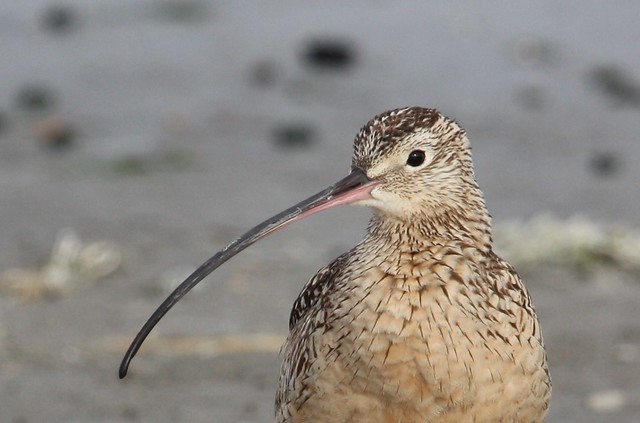
Long-Billed Curlew, photo via Flickr
Okay, so Mr. Snickerdoodle and I may have jumped on the birding bandwagon after reading (and loving) The Big Year. Is there a birding bandwagon? I dunno. Whatever the case, everyone in this family (even the 3 year old and 1 year old) has gotten really excited about birding (or bird-watching) lately. We've now got a (very amateur) family life list, and have started spending most of our family fun time looking for birds.
We've long been aware of the Pigeons, robins and quail in our neighborhood, but had no idea until recently that we had a Downy Woodpecker living in our yard, that House Finches and Northern Flickers have been regular visitors to our bird feeder, that the flock of pretty little birds in the trees outside Mr. Snickerdoodle's office are Cedar Waxwings, and that a few of the birds we thought were pigeons are actually Eurasian Collared Doves.
It's been amazing to see the variety of birds that surround us on a regular basis. They've always been there, but we're just now starting to appreciate them. It kind of makes me wonder what else we're missing out on because we're not paying attention...
We spent a little time yesterday at a Migratory Bird Refuge on our way home from Nana's house, where we got an up-close look at a Long-Billed Curlew (pictured above) and a Blue Heron, along with about 10 other birds we hadn't seen yet.
Very Exciting.
And yes, without a doubt, very nerdy. But in a world where where it seems to get harder and harder for kids to develop any sort of real relationship with nature, I'll take nerdy any day if it means my kids are excited about being outside and looking around.
As far a bird guides go, we've really loved Stan Tekiela's bird field guides. Our copy is Birds of Utah, but he's published one for every state (Birds of Alaska, Birds of Alabama, etc.). We love them because they are so user (and even kid) -friendly. The birds are organized by color and then size, so you don't have to know a bird's name to look it up. The field guides also include only birds you're likely to find in your State, so you don't have to shuffle through pages and pages of unrelated birds. They've been perfect for beginners like us.






No comments:
Post a Comment